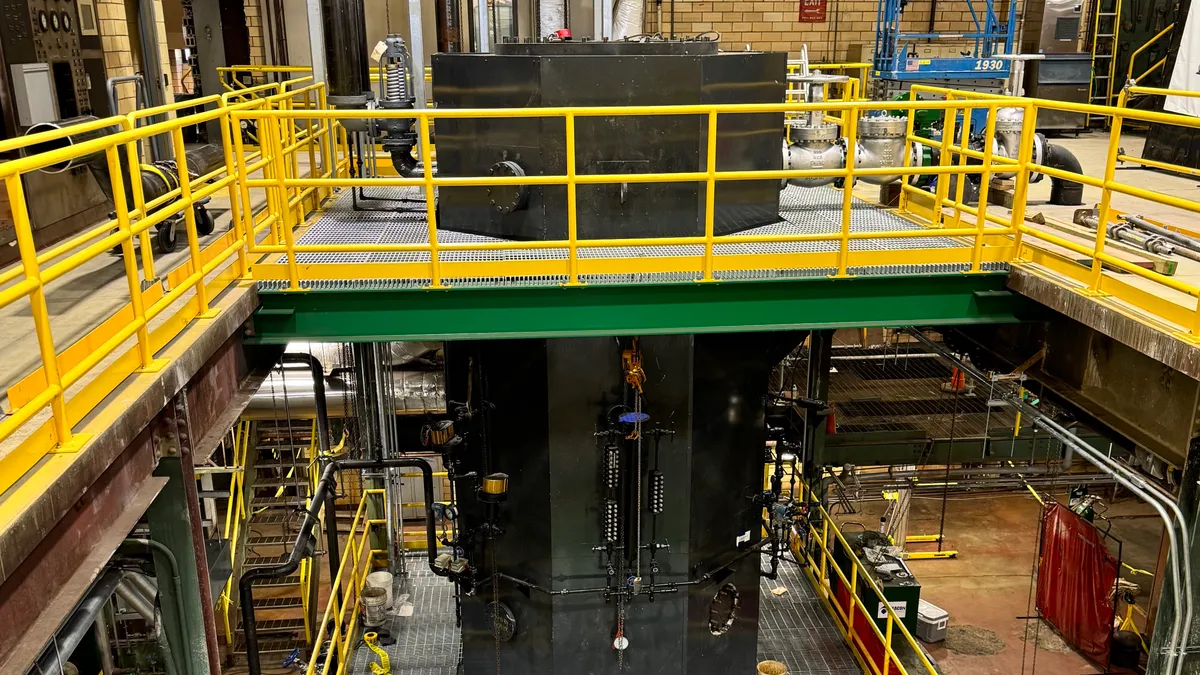Dive Brief:
- Emerson College in Boston has become the first college to convert 100% of its heating operations to carbon-free electricity by implementing a renewables-based thermal energy solution, according to a June 26 news release.
- The higher education institution’s 1.5 million-square-foot campus will use Vicinity Energy’s eSteam technology for all of its heating and hot water requirements, per the release.The technology “will be integrated into Emerson College’s building management systems without the need for upgrades or retrofits,” Brian Mueller, chief development officer at Vicinity Energy, said in an email.
- Vicinity Energy CEO and President Kevin Hagerty said in a statement that the technology can provide a “replicable model for higher education institutions to rapidly decarbonize.”
Dive Insight:
Vicinity procures carbon-free electricity from renewable energy sources like wind, solar and hydropower to generate eSteam through a combination of heat pumps, electric boilers and thermal storage technologies, according to its website.
The eSteam product, which is then distributed to customers through underground piping infrastructure, provides operational flexibility that allows operators to switch fuel and generating sources to avoid service interruptions, Vicinity says.
The transition to eSteam reinforces the college’s goal of becoming carbon neutral by 2030, Emerson College said.
Although the transition to eSteam will not fundamentally change Emerson College’s ongoing maintenance and operational costs, one key benefit of the thermal energy technology is that it does not require any changes in operational or maintenance procedures, according to Mueller. “To provide this carbon-free steam, Vicinity Energy is retrofitting our central Kendall facility in Cambridge, Massachusetts, with state-of-the-art electric boilers and heat pumps. These upgrades enable us to generate steam without relying on fossil fuels, significantly reducing our and our customers’ carbon footprints,” he said.
“By integrating these advanced technologies into our existing infrastructure, we ensure that eSteam is a straightforward and hassle-free solution for decarbonization,” Mueller added. He noted that customers like Emerson College can continue to reap the benefits of district energy without a need for additional investments or changes to their systems, while simultaneously contributing to “a more sustainable future.”
Emerson College, regularly ranked among the top 50 green colleges in the U.S., has earned a Gold status in AASHE’s Sustainability Tracking, Assessment and Rating system, or STARS, per the release. STARS is a self-reporting framework for colleges and universities to measure their sustainability performance.
The partnership with Vicinity Energy “sets a new standard for sustainability within urban higher education institutions, and we are proud to lead by example, demonstrating that significant, sustainable change is possible and necessary for the future," said Jennifer Lamy, associate director of sustainability at Emerson College, said in a statement.
Prior to deploying the eSteam technology, Emerson College has been a customer of Vicinity Energy for over 25 years, drawing on “the reliability and efficiency of district energy”, Mueller said.
He added that eSteam will place Emerson College in a strong position to comply with the Boston Emission Reduction and Disclosure Ordinance, a local law that requires property owners to report their buildings’ annual energy and water consumption. Starting in either 2025 or 2030, depending on their size, buildings will also need to comply with emission limits set by BERDO with a goal of reaching net-zero emissions by 2050, according to the city of Boston.














